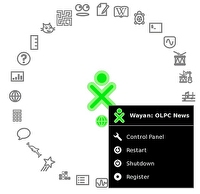The end of the year tends to be a time of reflection and retrospective for many people. So I too thought about writing up my thoughts on the most important events in 2008. There's plenty to talk about with OLPC's (largely just perceived) move to Windows XP, Walter Bender leaving OLPC and subsequently founding Sugar Labs, olpcnews announcing the "post-1CC era", the announcement of the XO-2 design, the release of Sugar 8.2, the return of G1G1 at the end of the year, etc.
However while going back through some of the posts we published in 2008 I realized that it would actually be more interesting to look ahead rather than back. Especially since we know that many of our readers have been with us for quite a while and therefore already know about all the drama anyway.
So here's my personal list of things I want to read and write about when I look back at 2009 on December 31st, 2009:
Sugar
To say that Sugar had its ups and downs in the past 12 months would be quite an understatement. Sugar Labs and the larger Sugar community will have to deal with a lot of challenges in 2009. A lot of work still needs to go into establishing "Sugar" as an identity that's separate from OLPC.
Even hanging out at Linux conferences and meetups a lot of people simply talk about the XO and its custom OS. The fact that Sugar has gone through adolescence and is quickly growing up has largely gone unnoticed so far.
Additionally there's been talk of OLPC wanting to focus on "deployability" with its first 2009 software release which naturally leaves less resources to put into improving Sugar itself.
The task of evolving Sugar is also an enormous one. Software release 8.2 was an impressive demonstration of how much progress can be made within a bit more than 6 months of development time. Yet it's obvious that a lot of things still need to be done.
The "group"-view is quite useless at the moment. The Journal needs a bunch of tweaks and improvements to be usable over long periods of time. Collaboration is still somewhat iffy in many scenarios. Running Sugar, and it being really usable, on platforms other than the XO is still a pain in the rear. The number of cool educational activities or simply awesome and fun games needs to improve dramatically. I could go on and on and on...
The point here is that people have already started working on many of these open issues. 2009 will be the year to see whether things are going in the right direction and progressing at a good pace. Walter Bender and everyone else working on Sugar will certainly be busy for the foreseeable future.
Learning
All too often people forget that OLPC is really a learning-, rather than a regular hardware- or software-, project. The success (or failure) of OLPC won't be measured in bootup speed, geek appeal or number of units sold via Give 1 Get 1. The key ingredient that OLPC has to get right is learning.
This also happens to be the toughest challenges that OLPC is facing. Sure, setting up IT equipment (and maintaining it!) in some of the remotest areas of the world isn't easy by any means. But I'm confident that these and similar challenges can be overcome with reasonable effort.
However the effective use of computers in education has been something that people have been working on for several decades. Yet the results, to the best of my knowledge, remain largely inconclusive and are very dependent on a variety of local variables. Yes, sometimes things work out great and at other times they don't. What's missing is a clear and generally applicable recipe of some sort that explains how to make IT work in education.
Coming up with this recipe, or at least an understanding of such a recipe might broadly look like, is what OLPC and the large olpc community should really be focusing on in 2009!
Results
The key thing that we need to hear about in 2009 are results. To me the core question here being: "How does OLPC affect learning?" This is after all a learning project and while 6 to 18 months of use - depending on when the particular deployment or pilot was started - won't yield any conclusive scientific evidence there will be the first solid indications of what happens when OLPC gets introduced in schools around the world.
OLE Nepal has done a great job of reporting on the progress and evaluating the results of the work they're doing. However this only represent 135 children and their teachers in a single country. What about the other 300,000 children that have received XOs so far according to OLPC?
I'm especially interested in what's happening in Peru and Uruguay since these are currently the largest and longest-standing deployments with more than 100,000 XOs having been distributed in each country respectively. What will the initial results of One Laptop per Pacific Child be? OLPC Oceania's concept paper certainly shows that they've invested a lot of time and thought in planing their deployment so it will be exciting to see how things work out for them.
I also expect a number of independent, interesting and critical papers to be written about OLPC as more people with a background in education and international development start looking at the project and its impact on communities around the world.
In my mind it's these results, more than anything else, which will determine the future of OLPC.
At the end also allow me to mention what I think will, but shouldn't necessarily be, a topic that many (including myself;-) will probably spend too much time talking about in 2009: the XO-2.
What do you want to hear about in 2009 when it comes to OLPC? Let us know by posting a comment below or by submitting your own article as a Guest Post.





I am with you Christopher. I would like to hear about results, including learning results among those children using the OLPC in the parts of the world that it was originally intended for.
Happy New Year to you, too!
xo CG
This post confirmes my fear-which I have expressed in a previous comment-that the OLPC project is irreversably spinning off its stated objectives. Even those who have left its official iteration seem to have come up with a system that would be a resource drag, on the administrations that needs to work it.
What happened to the "plug and play"concept, where the intended end-user's convenience was the paramount focus? Attention is also unequally spread across the system's development and deployment, that dampens the interest of its intended target consumers: government education authorities and school administrations.
I will say this again: for a variety of reasons, a thick client-which the XO is-is simply an inappropriate system for kids to use.
I think the actual cost of hardware does not matter that much (TCO is much higher than laptop cost anyways), so arguing about XO being thick client is not a point in my opinion...
What I fear the most of is OLPC falling apart. Negroponte said they will HAVE TO outsource a lot of things, which means the power of the foundation could go rapidly down on a kind of "charity coordinator". They might end up maintaining the hardware specs only in the end...
I think the biggest positive is they generated a great deal of interest in the ICT4D field of research.
One important piece of unfinished business is getting average power draw of the XO down to half or less of the present power draw, to achieve much longer battery life.
There are a number of technical obstacles to overcome, and all must be fixed with software. Since a large number of XO's have been shipped already, hardware redesign is not a palatable option.
Until average power draw can be reduced to meet the original target, human-powered battery chargers are scarcely feasible, and cost of electricity for off-grid users will be painful.
I'm an outsider, and have not heard much news about progress in XO power reduction. From what I have gathered, it is a difficult challenge, not obviously impossible, but neither is it obviously achievable. So it probably has a lower priority than more clearly achievable goals.
My hope for OLPC is that they stick to the linux OS and throw XP away.
Using windows is clearly going to end up with more trouble than it might solve (not that I personally belive it solves anything). What happened to the idea of fiddeling with the software and the great potential in free (as in both speech and beer) software for the people using an OLPC?
These people have no money to spend on software and involving Microsoft will eventually mean that the get acustomed to their software and will have to pay volumes for software they really don't need. With linux they have an aboundance of free quality software at their disposal - without fee. Microsoft may have some good software for big buisness, but the OLPC hardware needn't this software since it will have to be upgradet to work at a reasonable speed (and antivirus was unlikely to be loadet in the XP demo).
This is not MS-bashing! The have products well suitable for many tasks - this however is NOT one of them.
I personally just recently started considering to support OLPC, but using windows (in any shape) I, sadly, just don't see the vision anymore. :-(
I guess what I'm trying to say above is:
Give us a clear statement on the issue - I see no clear evidence that the XO is staying on a linux platform... or moving for a windows platform.
And that does not help me in deciding for or against a donation.
The fifth point of OLPC mission is: Free and Open Source.
So - what I hear you sayin is: winXP goes FOSS or winXP on the XO is not going to happen?
Just been wondering... considering all the talk on Microsoft trying to convince everybody that their old XP is up to the task.
Give them a DOS-emulator. Then they can play DOOM networked and have great LAN-partys.
OK, why Doom? Mabye becouse it's a good "starting game" wich leads to other more sofisticated games later?
And give them a nice TORRENT-program so they can download what they need while playing the games.
Notepad/Google Maps/EXCEL sux. Those are for "2-legged intellectual donkeys".
* * * WORLD OF WARCRAFT * * *
and a good mp3-player is only thing needed when using a PC (or a laptop). PLUS THE MUSIC OF COURSE = TORRENTS.